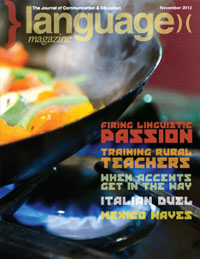Pursuing Happiness
As we enter the final throes of a presidential campaign that has focused largely on global economic issues, perhaps we should be concentrating on policies that will really make a difference to the lives of our children and the future of our country. We would be naïve to believe that the success of the global economy is actually within the domain of our government, let alone the Executive. Whatever they may say, neither candidate can do that much to alter the cycle of our interdependent world economy, but they can influence the preparation of our children so that they have the opportunity to lead happier and more rewarding lives.
Education has received short shrift during this campaign — perhaps rightly so — it is not constitutionally within the domain of federal government. However, successive administrations have sought to put their mark on our states’ educational systems to the extent that we now accept, or even expect, intervention and its federal dollars.
And, maybe we should. According to the Declaration of Independence, one of our unalienable rights, for the protection of which we institute government, is the “pursuit of happiness.” Some people may find happiness in material wealth while others may find it through spiritual development but most of us find some joy in our interactions with fellow human beings. So, who could argue that education, and especially language and literacy education, does not contribute to the pursuit of happiness?
For that reason alone, our presidential candidates should be paying more attention to education, and they should be clear about their policies regarding the promotion of language education.
The learning of other languages has other more practical benefits, such as its positive effect on cognitive ability, its value in business, and its contribution to security but sometimes, we concentrate too much on the utilitarian side of education and ignore the importance of living life to the full. Of course, tight budgets force us to justify everything we do in terms of returns on investment but there is a lot more to education than merely preparing kids for work. Education should help students lead a more enjoyable life and speaking another language makes life more fun.
It was Aristotle who said, “Those who educate children well are more to be honored than parents, for these only gave life, those give the art of living well.” And, a crucial part of educating children well in this communications age is teaching them languages.
New languages give us new perspectives, open up new cultures and opportunities — they help us live well and develop our potential. Thanks to the web, it’s now so easy to communicate internationally that you can start friendships within minutes. And what is more important in life than the development of relationships, and learning to understand and love our fellow travelers on this planet.
Rarely do we publish articles written by students but Alexandra Méndez’ feature (page 24) on love for language makes the all too easily overlooked point that we can only really enjoy, and really master, anything if we put passion into it.
Education is a profession and an art so educators need to use their heads and their hearts to teach well. Leaders that really take the interests of their people to heart, who want true prosperity rather than subsistence must make a commitment to language education and the opportunities it offers all of us in our pursuit of happiness.
IN THIS ISSUE:
Improving Character Recognition in Chinese
Stephen Krashen argues that meaningful reading is the route to literacy, whatever the language
Accenting Improvements
Lois Spitzer examines the sensitive subject of accent modification
Stirring Up Passion
Alexandra Méndez advocates falling in love with language as the route to mastery
La Doppia Vita
Simona Montanari proves how an Italian-English dual-language program in Southern California is improving English literacy
Bienvenido a Mexico
Despite the hype, Daniel Ward recommends two of the safest cities in North America for Spanish immersion
Plains Talking
Holly Hansen-Thomas and Liliana Grosso explain how Project SMARTTTEL will use technology to help rural teachers train English Language Learners in Science and Math
Last Writes Richard Lederer hops in with Kangaroo Words



